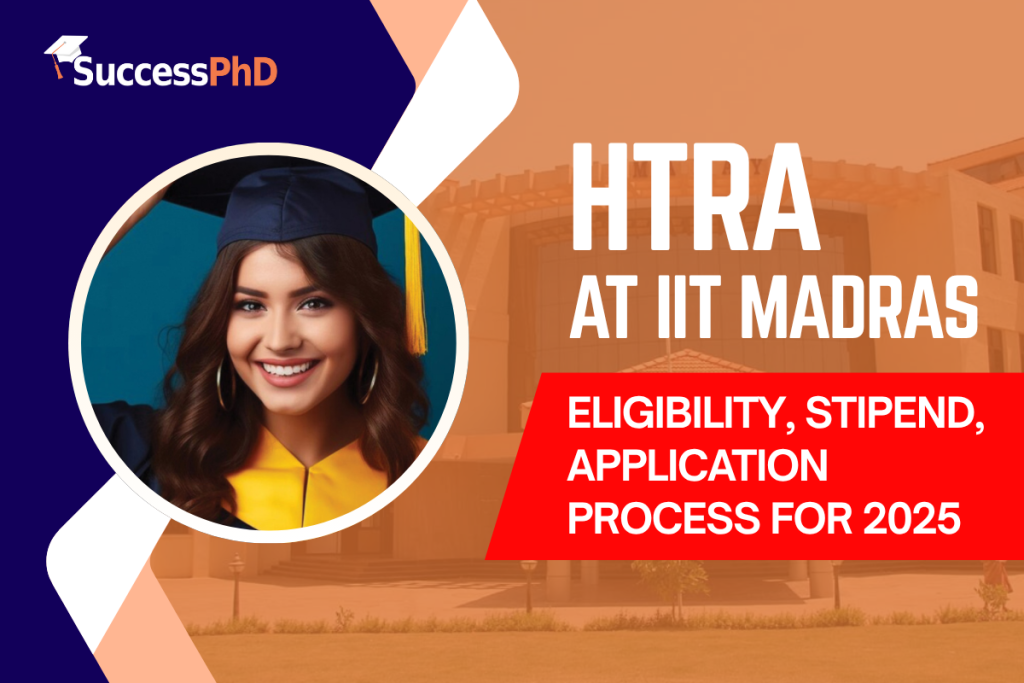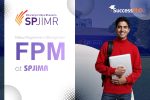₹42000 per Month Fellowship for PhD & MS Scholars for research through HTRA at IIT Madras 2025
- What is HTRA at IIT Madras?
- Objectives of the HTRA Scheme
- Eligibility & Financial Support
- How to Apply and Admission under HTRA
- Selection Process
- Why HTRA Matters at IIT Madras
- FAQs
What is HTRA at IIT Madras?
HTRA (Half-Time Research Assistantship) is an internal funding scheme at IIT Madras for regular full-time PhD and M.S. (by Research) scholars who were admitted to the “Regular” category. HTRA is essentially an institute fellowship in which the scholars assist their departments with academic/research responsibilities at an average of about 8 hours/week while being funded. Scholars can also be converted from project-based scholars to HTRA based on certain eligibility and conditions.
Categories of PhD admission in IITM include the following four types: Regular-HTRA, Regular-Fellowship, Regular-Project-HTRA, and Regular-Project-NHTRA.
Objectives of the HTRA Scheme
The Half-Time Research Assistantship (HTRA) Scheme at IIT Madras is not simply a funding program but part of a coordinated academic initiative to promote excellence in research itself, professional development of the student, and collaboration in teaching and research within departments. The HTRA Scheme has the following main objectives:
- Offer financial assistance to regular PhD / MS research scholars so that they are not overly stressed by financial obligations.
- Involve scholars in departmental academic or in research-type activities (8 hours/week) which assists departments while developing scholarly teaching/research skills.
- Give scholars the opportunity to stay focused on their research while contributing positively to departmental functions.
- Enhance the research productivity and academic environment of IIT Madras by providing support to early-career scholars.
Eligibility & Financial Support
The following are the Eligibility criteria and financial support provided under the HTRA scheme:
Eligibility
- The candidate needs to be admitted as Regular for a PhD or MS (by Research) at IIT Madras.
- Scholars must not be holding an external full-time fellowship (e.g. JRF) when being HTRA (otherwise the fellowship terms will follow the external fellowship).
- Scholars admitted for Project / non-HTRA categories can be converted to HTRA later if conditions set by the Department / Senate / Guide are met.
Financial Support
For PhD / Direct PhD / converted to PhD Scholars:
- – ₹37,000 per month for first 2 years
- – ₹42,000 per month for next 3 years
For M.S. (by Research) Scholars:
- – ₹12,400 per month for first 2 years (and 6 months more under certain GTC recommendation)
- – House Rent Allowance (HRA) is given as per Government norms for those not staying in hostel accommodation
- The tenure is coordinated with the program: for PhD under HTRA it is 5 years based on performance.
How to Apply & Admission under HTRA
Here are the procedures to apply for the HTRA at IIT Madras. The procedure is part of the regular PhD and MS (by Research) admissions process, and candidates who apply under the regular category to these programs will be reviewed for HTRA during the admissions process.
Application Process for Admission to the PhD / MS Program under the Regular Scheme
- During admissions periods (January / July), candidates will apply in the Regular category while indicating an interest in being considered for HTRA (or similar category). IITM’s admission brochure makes it clear that all candidates admitted under the Regular category will be eligible for HTRA, where applicable.
Departmental Shortlisting + Written Test / Interview
- The department may shortlist candidates for tests or interviews based on specified departmental norms.
Conversion of Project Categories
- Scholars who are initially admitted under project / non HTRA categories may be converted to HTRA at a later date, if they meet eligibility criteria, the necessary recommendation, and obtain departmental approval.
Renewal
- The HTRA must be renewed each semester, based on the scholar’s enrollment status in the research program, satisfactory research progress, and assistantship performance.
Documents Required
Even though the IITM admission booklet does not mention a specific list of “HTRA application” documents, the following will be typically required (throughout normal admission + HTRA process):
- Academic transcripts / mark sheets (UG, PG)
- Proof of qualifying exam scores (GATE / NET / etc.)
- Proof of PhD / MS admission offer, or proof of registration
- Identity proof (Aadhaar, Passport, etc.)
- A letter of undertaking / acceptance for 8 hours per week departmental responsibilities
- Departmental forms / recommendations as applicable as per Admissions Call
Selection Process
The process for selecting HTRA candidates at IIT Madras is structured to ensure that assistantship is allocated only to the best and most research oriented candidates. Candidates for appointment are assessed at each of several stages based on academic performance, research potential, and recommendations from departments. The process usually consists of the following steps:
- Under Regular category applications, selection is done via departmental shortlisting, merit listing across HTRA, fellowship, project categories.
- There may be a written test/interviews by departments of candidates.
- The final decision is made by departmental committees in collaboration with the central research or dean office.
- Scholars converted from non-HTRA to HTRA must satisfy all required HTRA documentation and department requirements and Senate or Guide or committee approval.
Why HTRA Matters at IIT Madras
The HTRA scheme represents a key component of the research system in place at IIT Madras. It guarantees that scholars are provided with financial support while gaining important academic and research experience. Listed below are the reasons HTRA is important for research scholars at IIT Madras:
- Offers consistent financial assistance for research scholars throughout their doctoral studies.
- Also requires that scholars contribute in an organized way (generally 8 hours / week) to department duties which adds teaching or lab experience.
- Also aids in holding accountability and performance because the decision on renewal is based on completion of duty and progression of their research.
- Provides flexibility, when scholars initially enter the program under project or non-HTRA tracks, they can move to HTRA if they further qualify.
- Supports IITM’s overall objective, which is to support full-time researchers without high levels of financial stressors so that the institute can continue to consolidate and grow in research.
FAQs
Q: What does HTRA represent?
Ans: Half-Time Research Assistantship.
Q: Who can apply for HTRA?
Ans: Scholars who have been admitted under the Regular PhD / MS (by Research) program at IIT Madras.
Q: How many hours of work is expected?
Ans: Around 8 hours per week in departmental responsibilities.
Q: What is the stipend?
Ans: For PhD: ₹37,000/month for the first 2 years and ₹42,000/month for the next 3 years. For MS: ₹12,400/month (for the initial period).
Q: If someone is getting an external fellowship, can they still get HTRA?
Ans: If someone is awarded a national level fellowship (for example, UGC-JRF, CSIR, etc.) they can be admitted under the fellowship category instead of HTRA; they will operate under the terms of eligibility for the fellowship.
Q: Can project scholars convert to HTRA?
Ans: Yes, subject to departmental recommendation, and meeting the eligibility criteria.
Q: Is renewal automatic?
Ans: No – every semester will include a review process based on enrollment, progress in research, and performance in work.
Conclusion
The HTRA Fellowship at IIT Madras is more than just a financial assistance program; it is a structured ecosystem meant to nurture skilled, independent researchers while strengthening the teaching and research productivity of the Institute. A core feature of HTRA is the provision of a stable monthly stipend, active exposure within a given department, and the ability to switch from being a project individual to developing their own research; it allows participants to devote themselves exclusively to their topic with no financial worries. For aspiring researchers, it provides both financial stability and contributes to professional development, which is something that very few institutions in India can offer: IIT Madras can offer worlds of rich and supportive learning for doctoral and research education training.








Comments